
We fly to Guilin on board a Boeing 737-400 of Hainan Airlines and fly over both the Yellow River and the Yangtze River, but because it is so cloudy we see neither. As we come into land at Guilin the weather is a little clearer and the strange limestone pinnacles, or karsts, for which it is known come into view. The scenery is amazing. Chinese children are taught that Guilin has the most beautiful scenery on earth. I have long known of its beauty and seen pictures of its famous mountains, and canít wait to explore them for myself.
The city is much bigger than I imagined, and turns out to be a thriving metropolis with all the hustle and bustle of Beijing. Motorcycles are everywhere you look, together with hordes of bicycles, cars, trucks and buses Ė all of them vying for their own space on the roads. A major difference with Beijing is the fact that all the motorcyclists wear crash helmets. I donít recall seeing anyone clad in one in the capital. The city's centre is buzzing with people and ablaze with neon lights, while coloured lights illuminate trees, promenades and features around the lakes, waterways and the Li River, along which chug sightseeing boats. It reminds me a bit of my home town, Southend, or perhaps Blackpool. The main square is a cross between Piccadilly Circus and the entrance to the Louvre in Paris, and each night the adjacent Lijiang Waterfall Hotel stages what the Guinness Book of Records recognises as the world's largest man-made waterfall, with water cascading 45 metres from its roof to a street-level pool.
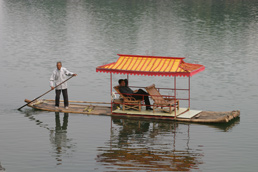
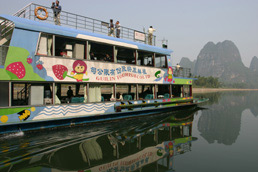
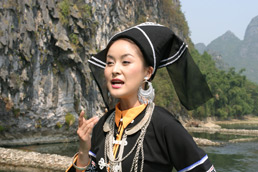
What brings the tourists to Guilin is the scenery, though. The strange karst formations march into the heart of the city, and we visit some sights with wonderfully-descriptive names such as Elephant Trunk Hill, Wave Subduing Hill, Returned Pearl Cave and Seven Star Park, which then US president Bill Clinton visited in 1998 to give a speech on environmental protection in the shadow of a rock outcrop called Camel Hill. I also get to meet the world's oldest Panda, Mai Mai, in the park's zoo.
I have to do a couple of pieces to camera, including one from the top of Folded Brocade Hill. Just getting to the top with the gear is a struggle because of the huge throng of visitors, most of them in tour groups from other parts of China. I am asked to include the fact that 10 million people a year visit Guilin, and it feels like all of them are there that day. But the stunning view from the top, spanning the city, the fishermen, ferries and pleasure boats on the Li River and the amazing limestone peaks is worth the hassle. I also get to visit Reed Flute Cave, one of three I see in Guangxi province. All have beautiful stalactite and stalagmite formations atmospherically lit by coloured spotlamps and each is very well presented. But after the third cave, which involves a boat ride past an animated dinosaur tableau which may lack Universal Studio's Jurassic spark but is enchantingly amateur, I feel caved out and my willpower has all but caved in.
A fleet of motor caravans is parked outside our Guilin hotel. The belong to a group of mainly Germans who have driven all the way across Europe, Russia, Mongolia and China as part of an incredible 10-month adventure to Asia. They invite me to join in their morning exercises before they set off for the next leg, to Vietnam, with my good wishes and admiration.
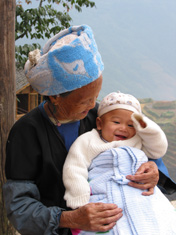
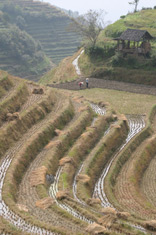
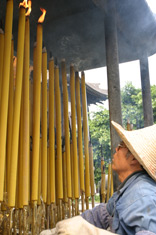
On the 25km drive to the cruise boat docks we pass countless tour buses returning empty after disgorging their human contents. My worries about another tourist invasion are ill-founded, though. The riverboat trip is a slick excercise and there are a number of passenger vessels departing or ready to board. We get on number 66, a modern three-deck craft catering for Chinese passengers, for the five-hour trip. Boats for Western passengers charge three times what domestic visitors pay. I later discover there are 200 of these river boats, and as we set off down the river we are in a convoy of some six or seven vessels spread out line astern.
There is hardly time to catch our breath before the karst mountains appear on the horizon. We are soon cruising past some of the most majestic and breathtaking scenery I have ever witnessed, together with fascinating scenes of rural Chinese riverside life. Each bend produces another scenic wonder and as the camera rolls I am almost lost for words, such is the magnificence of the setting. I have to discover my voice quickly, though. The director has organised a girl to dress in the typical costume of the Zhuang minority group and sing a welcome song to me - after which she has to teach me how to sing it. My tuneless and toneless effort is in stark contrast to the melodic version of the pretty songbird and sparks laughter from the other passengers, underlining my protestations that I am a terrible singer. I had earlier shown my lack of musical talent when invited to play the jinghu, a traditional Chinese instrument which can only be described as a bamboo violin, with a group of amateur singers and a musician practising in a cave.
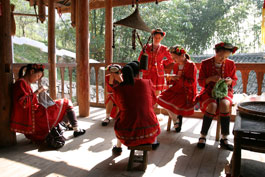
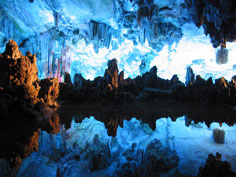
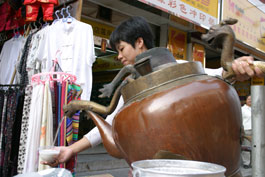
Journey's end is at Yangshuo, where arriving passengers have to negotiate the longest stretch of souvenir and snack stalls I have encountered. The town itself is wonderfully laid-back and full of tourists from around the world, among them a group of Swedes who tell me they have just eaten a poisonous snake and drank its blood dripped into a spirit. I also meet a French restaurant and hotel owner who has lived in China for 12 years. He collects old furniture and antiques from all over China to display in his restaurant because he says too many historic artefacts have been lost. I get my face painted on a t-shirt by a colourful character known as the Chinese Picasso and have to walk around town wearing it, feeling an idiot.
At nearby Silver Cave, where we rise early to photograph a less than spectacular dawn over the karst peaks before exploring the cave, I try mountain biking and then have to climb a limestone cliff face. It is getting increasingly like a Blue Peter exotic holiday report, or What Peter Did Next. I suffer from vertigo and cannot go near the edge of tall buildings so this is hell on earth for me. But I go through with it for the sake of the camera, until I get stuck and cannot go higher. Once back down I shake uncontrollably and am nearly sick, all on camera.
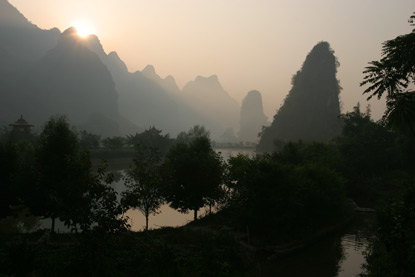
We say goodbye to our cameraman, Mr Dong, on the way back to Guilin as he is off to Russia on another assignment. A colleague will join us on the next leg. Meanwhile, we drive two hours' north to an area of minority groups set high in the mountains. The mountains all around Longsheng have been carved into rice terraces for more than 600 years, and the view down over what is known as the Dragon's Backbone after climbing up from the Zhuang village of Ping'an, where we stayed in a wooden guesthouse overnight, is awesome. Many of the villagers still wear their traditional costume while working the fields or in the village.
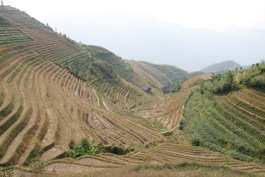
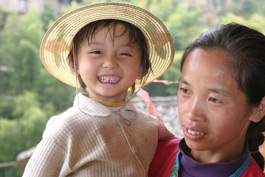
Further down the valley is another Zhuang village, which has some of the best-preserved traditional architecture of the Zhuang people. We dine there and I am once again serenaded by local girls. Thankfully the meal consists of local specialities but nothing as exotic as the camel hump served up at Silver Cave the day before.
Nearby is a village of a minority group called the Yao. The women and girls wear red dresses and costumes they make themselves, and are known as the Red Yao. Their claim to fame is the length of their hair, said to be the longest in the world. We get a group of them to lower their hair, remove the extensions and starting combing their hair - a regular ritual they do in the river by the village. Their hair is so long some strands hang down into the water. The woman with the longest hair, measuring 1.8 metres, is out of town, sadly. I chat to a couple of the women about their hair and customs, and the fact that the authorities allow them to have two children rather than the one only allowed normally in China.
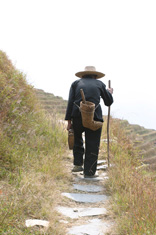

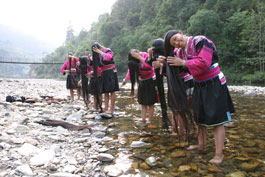

On the drive back to Guilin I am asked if I am hungry and reply flippantly that I could eat a horse. I should have known better. Once we have dropped our things back at the hotel we go out to dinner - at one of about four horse-meat specialist restaurants in Guilin. The meat was tender but I couldn't help thinking I was devouring a cousin of British racehorse hero Red Rum. His name spells murder backwards, and that is exactly how I felt. The final lunch is also memorable. Our tourist office host decides to mark the occasion by ordering a special drink just for the men. It turns out to be a sort of liquid Viagra - an aphrodisiac cocktail of local firewater infused with herbs and various animals or animal parts: seahorse, snake...and dog's testicles. I canít believe it. But it tastes great Ė it really is the dogís bollocks, as we would say in Essex!
We spend a couple of days in Guilin, bidding farewell to director Mr Zhang who leaves us to take on another project. The city has grown on me and I find the commotion and melee on the streets fascinating. I also love the way shops and businesses spill out onto the pavement and even roadsides, making the streets seem like a giant market. I didn't admit to our local hosts that I found it too big and brash when I first arrived, but it is a very friendly place with some wonderful scenery, great restaurants and food (horse-flesh aside) and lots of shopping and nightlife for those who want to do something other than sightseeing. It is also a great base from which to explore some of the most astonishing natural attractions anywhere in the world.
Next stop: Lijiang.